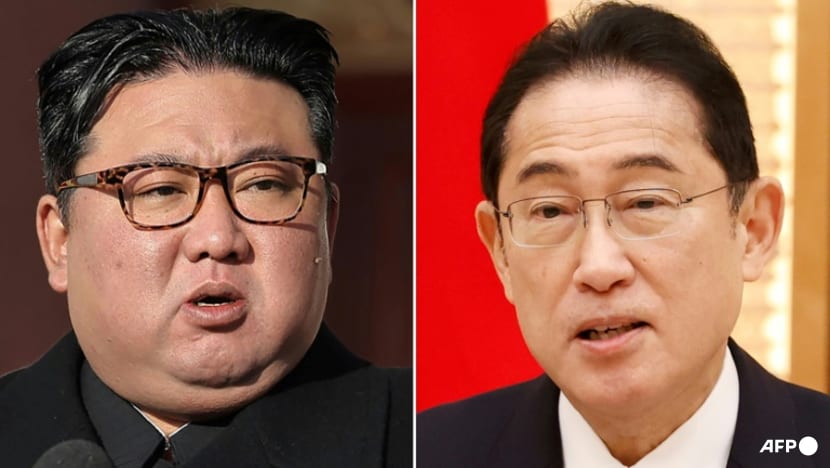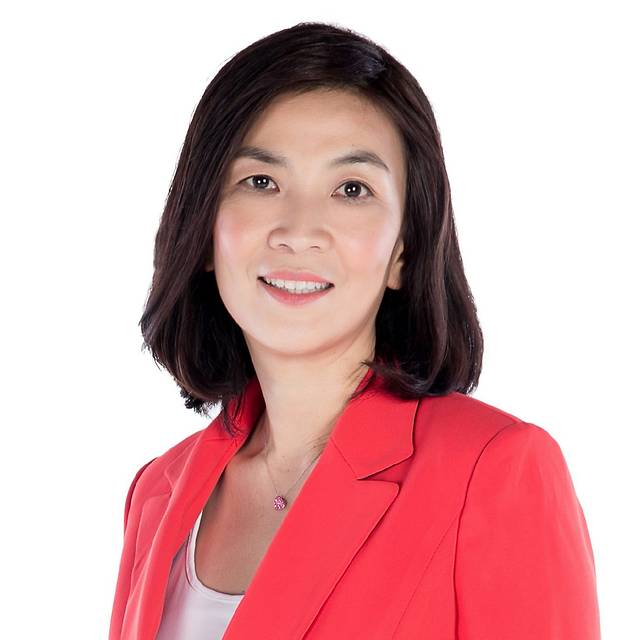CNA Explains: What are the chances of a first Japan-North Korea summit in 20 years?
Correspondents Lim Yun Suk and Michiyo Ishida look at why Japanese Prime Minister Fumio Kishida is pushing for a meeting with his counterpart in Pyongyang Kim Jong Un.

Japanese Prime Minister Fumio Kishida (right) last year said he was willing to meet North Korean leader Kim Jong Un "without any conditions". (Photo: AFP/STR, Yuichi YAMAZAKI)

This audio is generated by an AI tool.
TOKYO/SEOUL: Japan's Prime Minister Fumio Kishida is seeking a summit with North Korean leader Kim Jong Un. If he succeeds, he will be the first Japanese premier in 20 years to hold talks with a counterpart in Pyongyang.
How are relations between the two countries?
Before splitting into North and South, Korea was under Japanese colonial rule from 1910 to 1945. South Korea and Japan normalised relations in 1965, but diplomatic ties have never been formally reached between Pyongyang and Tokyo.
Relations between the two countries have been defined mostly by distrust and tension. From time to time, North Korea has demanded Japan apologise and compensate for atrocities committed during its colonisation.
What’s the main issue on the table?
North Korea is said to have abducted Japanese nationals in the 1960s, to train its spies in Japanese language and customs.
After years of denial, Pyongyang admitted to the kidnappings during the first leaders’ summit with Japan in 2002, when then-Japanese prime minister Junichiro Koizumi met with Kim Jong Il – his counterpart at the time and father of the current leader.
North Korea subsequently returned five out of 17 abductees officially identified by Japan, though both sides differ on the exact number kidnapped.
Japan believes North Korea has yet to provide an acceptable explanation for the fates of the other abductees. Pyongyang has claimed that the rest are dead and that the matter is settled.
Japan however has said that the remains sent back did not belong to those identified, based on DNA testing.
Many elderly family members of the abductees have since died, but the issue remains emotive in Japan. And so holding a summit and resolving this would bring broad public support for Mr Kishida.
What's also a point of tension?
Japan feels threatened by North Korea’s weapons development.
In recent years, Pyongyang has been testing the likes of nuclear-capable missiles designed to strike key facilities in Japan, South Korea and the United States.
This has prompted Tokyo to make the case for significantly increasing defence spending. In an annual white paper, Japan’s defence ministry described North Korea’s military activities as posing a graver and more imminent threat to national security than ever before.
Why else is Japan pushing for a meeting now?
In 2023, Mr Kishida said he was willing to meet face-to-face with Mr Kim without any preconditions, and to resolve all issues between them.
Mr Kishida hopes such a summit will help improve his approval ratings, which have been dented by issues such as a slush fund scandal involving his ruling Liberal Democratic Party. The LDP is set to hold a presidential election by September, and its incumbent leader Kishida will need its backing if he hopes to remain Japan’s prime minister.
There was optimism that Pyongyang would agree to a meeting, when Mr Kim sent Mr Kishida condolences in the aftermath of a deadly New Year’s Day earthquake in Noto Peninsula.
But not much progress has been made since.
How has North Korea responded?
Mr Kim’s powerful sister Kim Yo Jong has issued statements on being open to improving relations, and even inviting Mr Kishida to Pyongyang – but only if Tokyo “drops its bad habit of unreasonably pulling up (North Korea) over its legitimate right to self-defence and does not lay such a stumbling block as the already-settled abduction issue”.
She said if Japan continues to bring up these issues, it would prove that Mr Kishida’s push for talks is just an attempt to improve his popularity at home.
South Korean researcher Han Ki-bum, a fellow at the Asan Institute for Policy Studies in Seoul, said the fact that the North is showing some interest appears to be in line with its recent foreign policy moves.
Following North Korea’s summit with Russia last year, Mr Kim has attempted to expand diplomatic efforts, and a dialogue with Japan could be part of this. By extension, it might signal a willingness to engage with the US if conditions allow, said Mr Han, who dealt with North Korea for decades in his previous job as an intelligence officer.
Other analysts said North Korea could also be trying to shake up an alliance between Japan, South Korea and the US, which has presented a united front against Pyongyang.
Related:
What happened at previous summits?
During the first historic summit in 2002, Pyongyang apologised for the abductions of Japanese citizens; while Tokyo agreed to discuss compensation for causing the suffering of North Koreans during its colonial rule.
This became known as the Pyongyang Declaration, which was signed by both leaders in a bid to normalise ties. But further talks stalled as Japan insisted on deeper investigation into the abduction issue.
In 2004, both sides met again for the last time.
What are the chances of a summit taking place now?
For the summit to happen, North Korea would first have to agree to discuss the issue of the abducted Japanese nationals.
Japan will then have to reciprocate: For instance, if the two countries establish diplomatic relations, Tokyo will need to provide economic assistance to Pyongyang.
But that would be difficult in light of strict international sanctions imposed on North Korea due to, again, the rapid build-up of its nuclear and missile programme.
Overall, the ongoing disputes and deep-seated differences make a summit an unlikely prospect, and even if it does materialise, analysts are sceptical about whether it’ll bring favourable results.
Mr Han from the Asan Institute said Pyongyang has bigger priorities. These include another meeting with Russian President Vladimir Putin, a possible trip to Beijing and a sit-down with former US president Donald Trump, should the presumptive Republican Party nominee return to the White House.


















